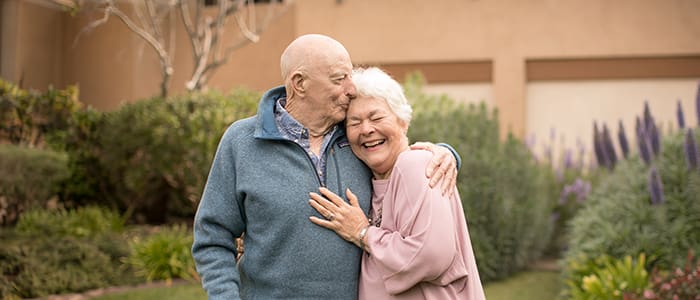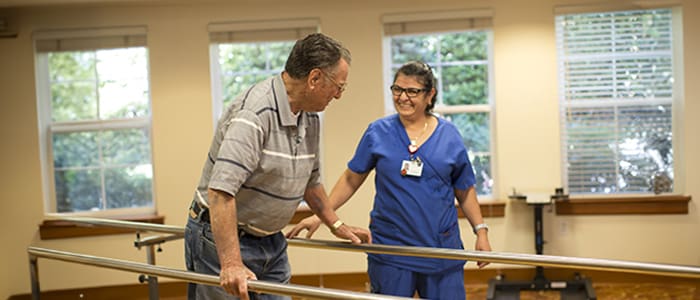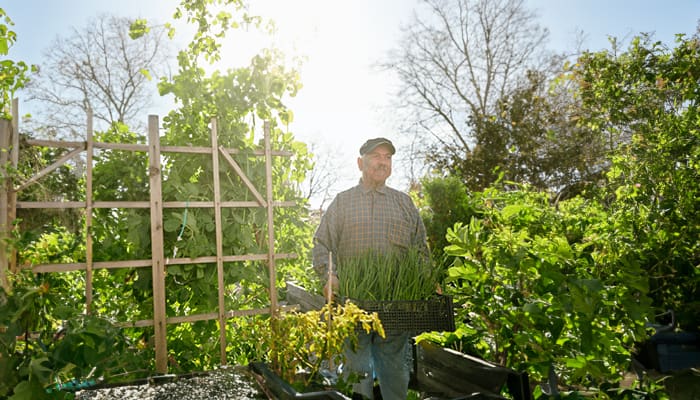February 27, 2019
What makes a workplace a Great Place?
Originally published in Engage Winter 2019
In December 2018, Sandra Crowder, Environmental Services Tech, was named Los Gatos Meadows Employee of the Quarter.
The Covia community shared on Facebook that “Sandra’s positivity and attention to detail inspires all who cross her path. She holds herself to very high standards and strives to provide excellence to residents, team members, and guests.”
For her part, Sandra says, “One of my goals at work is to make people smile and feel cared for which is easy here.” She adds, “Also I have a wonderful supervisor and I feel appreciated by my boss and the management.”
But which came first: Sandra’s high standards, or the appreciation of the management?
“What we find across all industries across all countries is that people want the same thing,” says Jacquelyn Kung, CEO of Activated Insights, a senior care company of Great Place to Work. “And it comes down to trust.”
Great Place to Work has been studying the elements of trust in the workplace for over 30 years. They have found five key elements: Respect, Credibility, Fairness, Camaraderie, and Pride. Together, these comprise the Trust Index – a measure that is tied to increased organizational performance.
According to Kung, the first three measures – Respect (I feel respected by my employer), Credibility (I can believe what my employer is telling me), and Fairness (I feel that decisions and policies are fair) establish a relationship built in trust. “What really elevates it even more is Camaraderie, which is with my coworkers, and then Pride in what I do,” she says.
For the first time this year, Great Place to Work has offered a list of Best Places to Work in Aging Services. Covia, a LeadingAge California member based in Walnut Creek, placed 29th overall.
The Trust Index has been shown to have a causal effect on improving the workplace. “You improve the Trust Index score, and your performance as an organization improves. In public companies, the best companies outperform the stock market index by a factor of 200 to 300 percent,” says Kung. “In our industry, higher Trust Index score, lower employee turnover. Higher Trust Index score, happier residents and families. Higher Trust Index score, better occupancy.”
Of the five dimensions of Trust, Covia rated highest in Pride and lowest in Fairness – a typical result for the Aging Services industry, according to Kung.
“Our industry compared to other industries really stands out for that reason – pride and purpose – and it’s the organizations that highlight and inculcate that best that seem to do best,” says Kung. “And of course they also are high in respect, credibility, fairness, camaraderie.”
For fairness, perception is key, and a lot of the perception is based on day to day activities, such as scheduling. “Scheduling is really important for this industry. If you’re not getting what you requested and you see someone else and you don’t know why, then it’s perceived as not fair.” One way to improve the perception is to make sure employees understand why something is the way it is.
Another common area of perceived unfairness is compensation. “Our industry does not do a good job communicating how compensation is determined,” notes Kung. “And compensation includes of course the pay itself, but also benefits, and having some sort of share in success.”
For Covia, which had been evaluating employee satisfaction through other surveys since 2010, the choice to partner with Great Place to Work made sense.
“Quite honestly, it’s a great recruiting tool,” says Prab Brinton, Covia’s Vice President of Human Resources. “The minute that you say, ‘We’re a great place to work,’ the candidate instinctively paints a picture of what that looks like for them.”
“I think the designation is also a good reminder for our current workforce,” she adds. “It reminds them: ‘Oh, wait a minute. Actually, you know what? We are a pretty good place to work because here’s what all of my peers are saying. Here are all the great things my employer offers me.’ It’s a great reminder, just from a retention perspective.”
“The other thing that was really good about this tool is that it’s also being able to tie our employee feedback to the resident experience,” says Brinton. With other surveys, “We got lots of great information, but how do you tie it into the resident experience? With Great Place to Work, we were able to give them that information and they were able to correlate that together for us.”
And of course, the Great Place to Work survey gave Covia information on where it can grow and improve, both overall as an organization as well as at a community or departmental level.
One area where Brinton feels Covia has room to improve is in building stronger relationships with employees, rather than spending the bulk of the time in bureaucratic tasks. “We have systems to handle day to day tasks. These systems help us move employee conversations from ‘did you fill out your benefits paperwork’ to ‘let’s talk about what would be the best benefit choice for you and your family.’ Or if you know that there’s a rising star within your community – the conversation turns to ‘Hey what are your plans? I know you’re getting ready to graduate from school, what are you planning to do? Have you considered this kind of position with us?’ We should be turning it more into that kind of relationship. We spend a lot of time building those relationships with our residents. We need to do the same with our employees.”
In her one-on-one meetings with her direct report, Brinton focuses on four areas: the status of current projects; any roadblocks or concerns; current successes; and ongoing career development needs and desires. “I do think that a lot of times in many organizations, HR falls into the role of ‘managing’ employees through their tenure. The true role of HR should be to create an environment that employees can come in and do a great job every day and feel pride in the job that they are doing. We’re also here hopefully to educate in some way, to help employees along their career path.”
And if the original career path doesn’t work, there may be another way to use a talented employee’s skills and talents. Gina Secchi, Marketing Coordinator at St. Paul’s Towers in Oakland, started her career at Covia as the Catering Manager at San Francisco Towers. “I loved the event planning and the San Francisco Towers residents and felt mentored by [Director of Dining Services] Larry Brooks,” says Secchi. “Unfortunately, the commute was too much and I wasn’t going to be able to stay. When I mentioned this to Larry, he was instrumental in me coming to St. Paul’s Towers. He knew my strengths and suggested to [Executive Director] Melody Mitchell and [HR Director] Donna Tendler that I work at St. Paul’s as the marketing coordinator and they all helped me to do so. Larry made me feel very respected because he said, ‘I wish you could stay here but I would rather have you work for Covia than have the company lose you.’” Secchi is now considering getting a degree in Marketing. “I know that Covia has a program that assists with going back to school and I am looking into participating in this program.”
“I would say to other aging services companies, figure out ways to make your employees feel connected to the organization, to the management teams, to the other employees. I think that goes a long way,” says Brinton. “If you don’t feel connected to your spouse or partner, you say, ‘OK, I need to find greener pastures.’ It’s the same thing on employment. If employees don’t feel connected then they’ll ask themselves, ‘Why should I keep coming here? You don’t value anything that I bring to you.’ It’s really being able to harness the connection between employer and employee.”
“Covia believes that every single employee is essential and vital to our team. Our management staff works hard to communicate this and to be sure everyone is treated that way,” says Ron Schaefer, Chief Operating Officer. “Covia is also a great place to work because of the important work we do: supporting older people to live well and age well.”
“There are always the usual things: you have pay, you have benefits,” says Brinton. “I think more importantly are the people you work with, believing in the mission of the organization, and being surrounded by a bunch of people who are driven by that same thing. I think that makes Covia a great place to work.”
Brinton adds, “I think something that makes us unique over numerous other industries outside of senior living is the employees get to feel like they have an extended family outside of your work family. You have these great seniors or elderly people that you are interacting with on a day to day basis. One, they’re very grateful that you’re there helping them. But two, just think about all the stories you get and the added knowledge or learning. You just feel connected.”
This connection is clearly felt by Sandra Crowder at Los Gatos Meadows. “I truly give my all to Covia and the residents,” she says. “I also receive a lot of joy from the residents in return.”






